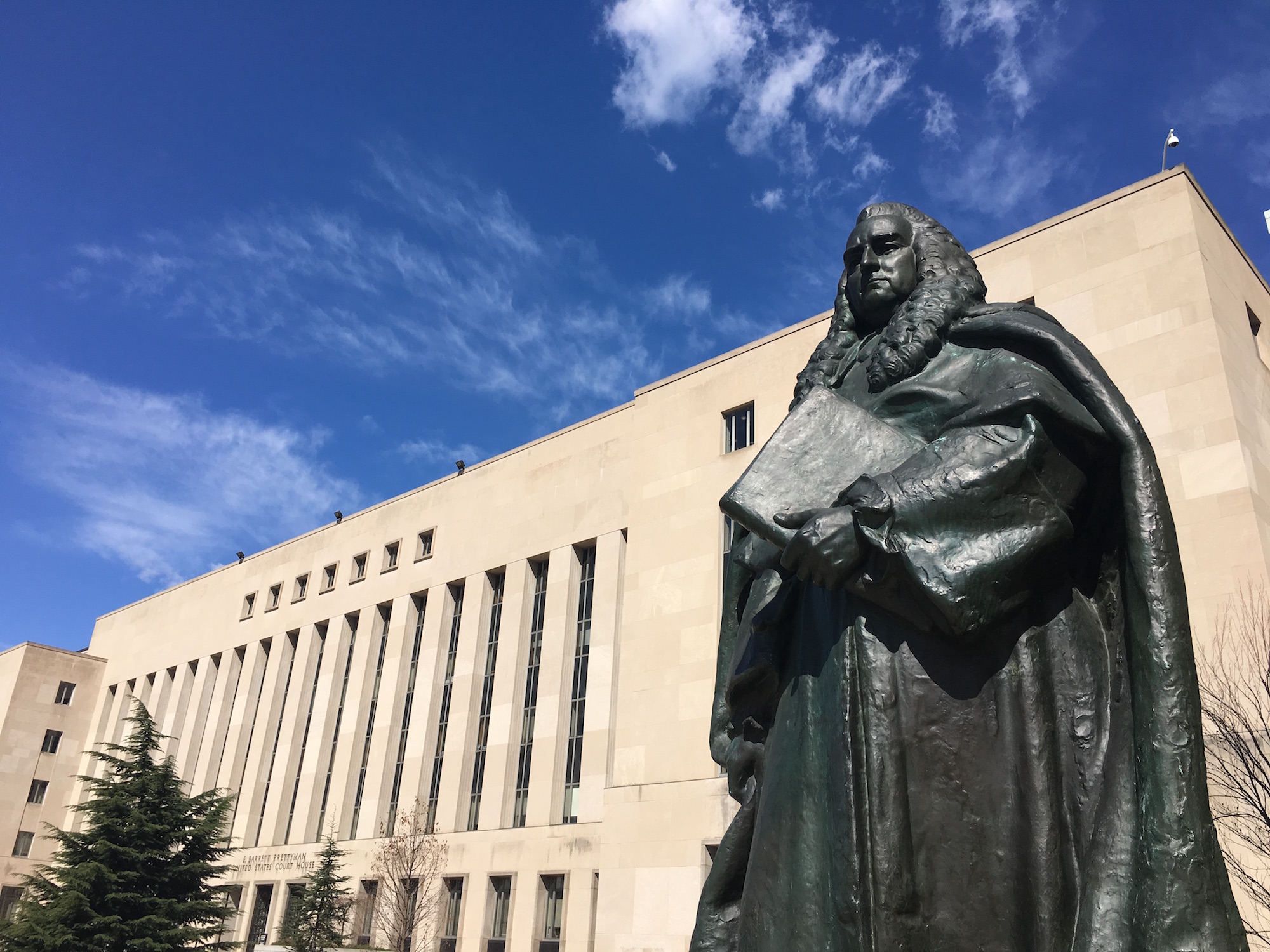
The E. Barrett Prettyman United States Courthouse houses both the federal court for the District of Columbia and the Circuit Court of Appeals for the District of Columbia Circuit. Photo by Indianz.Com (CC BY-NC-SA 4.0)
The Ute Tribe filed a third CARES Act lawsuit on April 23, 2020, as a federal judge weighs the fate of an $8 billion coronavirus relief fund.
The Utes, based in Utah, join 17 other tribes in seeking to prevent Alaska Native corporations from receiving a share of the money that was supposed to go out on April 24 but has been delayed due to ongoing discussions at the Department of the Treasury.
“The tribe currently does not know the full extent of the financial harm and costs which COVID is causing and will cause to the tribe, but the tribe knows that it is millions of dollars each month,” Chairman Luke Duncan said in a sworn declaration.
“We also do not know exactly how much of the $8,000,000,000 that Congress granted to tribal governments will go to the tribe, but the range of estimates we have seen are all below the financial harm that COVID is causing to my tribe,” Duncan told the court.
- DECLARATION: Chairman Luke Duncan
- MOTION: Temporary Restraining Order and Preliminary Injunction
The case has been assigned to Judge Amit P. Mehta, who held a two-hour hearing on the afternoon of April 24 in connection with first two CARES Act cases. The plaintiffs in Confederated Tribes of the Chehalis Reservation v. Mnuchin are:
- Confederated Tribes of the Chehalis Reservation (Washington)
- Tulalip Tribes (Washington)
- Houlton Band of Maliseet Indians (Maine)
- Akiak Native Community (Alaska)
- Asa’carsarmiut Tribe (Alaska)
- Aleut Community of St. Paul Island (Alaska)
- Navajo Nation (Arizona, New Mexico, Utah)
- Quinault Nation (Washington)
- Pueblo of Picuris (New Mexico)
- Elk Valley Rancheria (California)
- San Carlos Apache Tribe (Arizona)
The plaintiffs in Cheyenne River Sioux Tribe v. Mnuchin are:
- Cheyenne River Sioux Tribe (South Dakota)
- Rosebud Sioux Tribe (South Dakota)
- Oglala Sioux Tribe (South Dakota)
- Nondalton Tribal Council (Alaska)
- Native Village of Venetie (Alaska)
- Arctic Village Council (Alaska)
Judge Mehta heard from the attorneys representing the plaintiffs in both cases this afternoon. He indicated he will include the Ute Tribe going forward by consolidating all three lawsuits.
The Department of the Treasury has determined that Alaska Native corporations qualify for shares of the $8 billion coronavirus relief fund. But the agency has not decided how to distribute the money, which is the reason why it is not expected to go out until April 28 at the earliest.
“As far as a methodology, I can’t even speak to that even if I knew the answer,” attorney Jason Lynch from the Department of Justice told the court when asked about the formula, methodology and other facets of the distribution.
During the hearing, Mehta said he will issue a ruling on Monday.
#CARESAct hearing just concluded. Lasted about 2 hours amid numerous technical difficulties. Treasury Department doesn't plan on disbursing $8 billion #CoronavirusReliefFund until April 28, 2020, at earliest so tribes will have to wait till next week to get #COVID19 relief funds.
— indianz.com (@indianz) April 24, 2020
Delay is linked to efforts to determine how to distribute $8 billion #CoronavirusReliefFund. According to Justice Department, Treasury still hasn't figured it out. "As far as a methodology, I can't even speak to that even if I knew the answer," attorney Jason Lynch told court.
— indianz.com (@indianz) April 24, 2020
In other words, delay at Treasury has nothing to do with #CARESACt lawsuits, of which there are now three. 11 tribes in first, 6 tribes in second, 1 tribe in third. Among plaintiffs are 3 tribes from Alaska. #CoronavirusReliefFund #8BillionQuestions #COVID19 #Coronavirus
— indianz.com (@indianz) April 24, 2020
